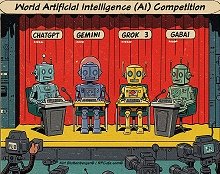Electronics Pioneers & History
- See Full List of AI Topics -
 Thomas Alva Edison (1847-1931) was an American inventor and businessman who
made significant contributions to various fields, particularly in the realm of
electrical engineering. He is widely regarded as one of the most influential
inventors in history and held over a thousand patents for his inventions and
innovations. Thomas Alva Edison (1847-1931) was an American inventor and businessman who
made significant contributions to various fields, particularly in the realm of
electrical engineering. He is widely regarded as one of the most influential
inventors in history and held over a thousand patents for his inventions and
innovations.
Edison was born on February 11, 1847, in Milan, Ohio, United States. Despite
receiving only a few months of formal education, he was a voracious reader and
had a keen curiosity for science and technology from a young age. Edison's early
experiences in telegraphy and chemistry laid the groundwork for his future
inventions.
One of Edison's most notable achievements was the development of practical
and commercially viable electric lighting. He is credited with inventing the
incandescent light bulb, which revolutionized the way people lived and worked by
providing a safe and efficient alternative to gas and oil lamps. Edison's
extensive research and experimentation with various filament materials
eventually led to the creation of a long-lasting and practical electric light
bulb.
Apart from lighting, Edison made significant contributions to the advancement
of electrical power distribution. He established the first investor-owned
electric utility company in the United States, the Edison Electric Illuminating
Company, which brought electricity to homes and businesses in New York City.
In addition to his work in the field of electricity, Edison also invented or
greatly improved upon numerous other devices and technologies. Some of his
notable inventions include the phonograph, a device for recording and
reproducing sound, the motion picture camera, and the alkaline storage battery.
His inventions had a profound impact on communication, entertainment, and
transportation industries.
Edison's approach to invention was characterized by relentless
experimentation and iterative improvement. He famously said, "Genius is one
percent inspiration, ninety-nine percent perspiration," emphasizing the
importance of hard work and perseverance in the process of innovation.
Thomas Edison's contributions to science and technology earned him widespread
recognition and acclaim during his lifetime. He received numerous awards and
honors, including the Congressional Gold Medal and membership in the National
Academy of Sciences. Edison continued to work on various projects until his
death on October 18, 1931, in West Orange, New Jersey.
Today, Thomas Edison's legacy lives on as his inventions and innovations
continue to shape the modern world. His entrepreneurial spirit and dedication to
practical problem-solving have inspired generations of inventors and innovators,
and his name remains synonymous with ingenuity and creativity.
 This content was generated by primarily
with the assistance of ChatGPT (OpenAI), and/or
Gemini (Google), and/or
Arya (GabAI), and/or Grok
(x.AI), and/or DeepSeek artificial intelligence
(AI) engines. Review was performed to help detect and correct any inaccuracies; however,
you are encouraged to verify the information yourself if it will be used for critical
applications. In all cases, multiple solicitations to the AI engine(s) was(were)
used to assimilate final content. Images and external hyperlinks have also been
added occasionally - especially on extensive treatises. Courts have ruled that AI-generated
content is not subject to copyright restrictions, but since I modify them, everything
here is protected by RF Cafe copyright. Many of the images are likewise generated
and modified. Your use of this data implies an agreement to hold totally harmless
Kirt Blattenberger, RF Cafe, and any and all of its assigns. Thank you. Here is
Gab AI in an iFrame. This content was generated by primarily
with the assistance of ChatGPT (OpenAI), and/or
Gemini (Google), and/or
Arya (GabAI), and/or Grok
(x.AI), and/or DeepSeek artificial intelligence
(AI) engines. Review was performed to help detect and correct any inaccuracies; however,
you are encouraged to verify the information yourself if it will be used for critical
applications. In all cases, multiple solicitations to the AI engine(s) was(were)
used to assimilate final content. Images and external hyperlinks have also been
added occasionally - especially on extensive treatises. Courts have ruled that AI-generated
content is not subject to copyright restrictions, but since I modify them, everything
here is protected by RF Cafe copyright. Many of the images are likewise generated
and modified. Your use of this data implies an agreement to hold totally harmless
Kirt Blattenberger, RF Cafe, and any and all of its assigns. Thank you. Here is
Gab AI in an iFrame.
AI Technical Trustability Update
While working on an update to my
RF Cafe Espresso Engineering Workbook project to add a couple calculators about
FM sidebands (available soon). The good news is that AI provided excellent VBA code
to generate a set of Bessel function
plots. The bad news is when I asked for a
table
showing at which modulation indices sidebands 0 (carrier) through 5 vanish,
none of the agents got it right. Some were really bad. The AI agents typically explain
their reason and method correctly, then go on to produces bad results. Even after
pointing out errors, subsequent results are still wrong. I do a lot of AI work
and see this often, even with subscribing to professional versions. I ultimately
generated the table myself. There is going to be a lot of inaccurate information
out there based on unverified AI queries, so beware.
Electronics & High Tech
Companies | Electronics &
Tech Publications | Electronics &
Tech Pioneers | Electronics &
Tech Principles |
Tech Standards Groups &
Industry Associations | Societal
Influences on Technology
|









